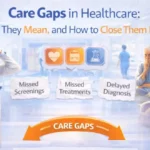Principal Care Management (PCM) & CPT Codes For 2025

Principal Care Management (PCM) is a preventive program designed to assist individuals in managing a single chronic illness. Medicare Part B covered clinicians should be aware of the CPT codes for billing PCM services and maximize care delivery along with preventing the risk of getting your claim rejected.
Medicare Part B patients have minimal co-pay for PCM and can benefit from individualized care plans and support in developing self-management practices with PCM program.
Table of Contents
ToggleIntroduction To New PCM CPT Codes
In the Principal Care Management category of the Medicare Physician Fee Schedule (MPFS), the Centers for Medicare & Medicaid Services (CMS) replaced the former PCM codes (HCPCS codes G2064 and G2065) with four new CPT codes.
PCM is all about reimbursing physicians for the additional work they do when caring for high risk complex chronically ill patients, including medication changes, creating a comprehensive care plan, patient follow-up and more. CMS is aimed at improving care coordination for PCM patients and trying its best to keep them out of the hospital, even if it requires paying more to the physicians.
What Is CPT Code 99424?
This code includes the first 30 minutes of PCM services per calendar month, which includes a physician’s or qualified healthcare professional’s preparation of a disease-specific care and treatment plan. CPT code 99424 is an extension of the services previously offered under G2064.
Physicians, qualified healthcare professionals, advanced practitioners, physician assistants, and nurse practitioners are eligible to bill under CPT Code 99424. The average reimbursement rate for CPT 99424 is $83.40 per patient per month for every 30 minutes of time (reimbursement amount varies across locations).
What Is CPT Code 99425?
The CPT code 99425 is for each extra thirty minutes that a physician or qualified healthcare professional performs throughout a calendar month. This often involves continuous adjustments that are not only related to primary care management but also a part of the proactive medication management for patients.
Medical professionals, qualified healthcare professionals, advanced practitioners, PAs, or NPs are eligible to bill under CPT Code 99425. The average payment for this code is $60.22 per 30 minutes of time (the amount varies across locations).
What Is CPT Code 99426?
The first 30 minutes of PCM clinical staff time, as performed by clinical staff under the supervision and guidance of a physician or qualified healthcare professional, is covered by CPT Code 99426. It is an extension of what was previously available under G2064 along with 99427.
Clinical professionals and nurses who are employed under the particular supervision of a doctor or qualified healthcare professional, such as a PA or NP, are qualified billing practitioners for CPT Code 99426. The average reimbursement for CPT 99426 is $63.33 per 30 minutes of time (the amount varies across locations).
What is CPT Code 99427?
Each additional 30 minutes of PCM clinical staff time, as performed by clinical staff and nurses under the supervision and guidance of a doctor or qualified healthcare professional, is covered under CPT Code 99427.
Clinical professionals, nurses, qualified health care professionals (QHPs), advanced practitioners, PAs or NPs are eligible billing practitioners for CPT 99427. The reimbursement rate for this code is $48.45 for 30 minutes of time (the amount varies across locations).
All About The Billing Requirements For PCM CPT Codes
In between routine visits, PCM allows providers to engage patients once a month. Being delivered remotely over the phone or telehealth platform, it is billable when the patient spends at least 30 minutes completing the necessary tasks. PCM services include:
- Monthly clinical evaluations
- Calls made over phone
- Medical evaluations
- Medical referrals
- Refills for prescription drugs
- Chart evaluations
- Setting up services or appointments
To be eligible for billing PCM, a patient must have one chronic illness. The patient’s physician must also document the condition at least twelve months before their enrolment. An acute decompensation, significant risk of hospitalization, body function decline, or risk of death must be there. Medicare Part B covers 80% of PCM benefits for patients.
Who Can Provide Principal Care Management (PCM)?
An NPI-accredited provider must oversee the PCM billing process. Nonetheless, the majority of the program can be run by qualified clinical administrators, saving doctors’ time and commitment. Other eligible providers include:
- Medical professionals
- Medical assistants
- Licensed nurses practitioners
- Certified midwives
- Clinical nurse specialists
- Pharmacists
Medicare Claims Submission For PCM Reimbursement
When filing a Medicare claim, the following five items are needed:
- CPT codes for every patient program that you oversee
- ICD-10 codes associated with every disease you’re taking care of in that program
- Date of service
- Location of service (telehealth or in-office)
- National Provider Identifier (NPI) number
CPT codes 99424 and 99425 correspond to time spent by a doctor or other licensed healthcare provider.
Clinical staff time under the supervision of a physician or other licensed healthcare provider is denoted by CPT codes 99426 and 99427.
Streamline Your Reimbursements With HealthArc’s PCM Services
Utilize HealthArc’s digital monitoring platforms and cellular medical devices for efficient billing and care coordination.
Through the improvement of healthcare quality measures and healthy revenue generation, HealthArc’s holistic approach to Principal Care Management enables providers to provide care management services for their patients with a single chronic condition.
Schedule a demo now to gain insights on principle care management billing and reimbursement.
For expert guidance on PCM CPT codes, give us a call at +201 885 5571.
Frequently Asked Questions (FAQs)
PCM is defined as a medicare service model initiated on the year 2020 to manage one complex chronic condition which is expected to last a minimum of three months. It focuses on coordinated care to prevent functional decline and support functional stabilization as well as to prevent hospitalizations through tailored care plans and regular patient interactions.
The following four codes are cited:
99424 – First 30 minutes of PCM by a physician or licensed healthcare practitioner.
99425 – Each 30 minutes of PCM by that practitioner.
99426 – First 30 minutes of PCM by clinical staff under the supervising professional.
99427 – Each extra 30 minutes of PCM by clinical staff under supervision.
As of now, the national average reimbursement per month for each of the codes is as follows:
99424: 83 dollars.
99425: 60 dollars per 30 minutes.
99426: 63 dollars per 30 minutes for clinical staff.
99427: 48 dollars for each additional 30 minutes.
The billing must be done under the supervision of a physician or an NPP (nurse practitioner or a physician assistant), and a qualified clinical staff may include nurses, care coordinators, and pharmacists, and may provide the services under direct supervision “incident to” the physician’s services.
The criteria for eligibility are:
A single chronic condition anticipated to last for 3 months or more.
Presents considerable risks for hospitalization, functional decline, exacerbation, or even death.
Requires a documented verbal or written patient agreement prior to PCM initiation.
Only one provider or facility is permitted to submit a claim for PCM for a single patient in a given calendar month.
Time is inclusive of care coordination activities such as chart reviews, telephone follow-ups, medication checks, referrals, monitoring of objectives, and even appointment scheduling, provided these are done via phone, telehealth, or other remote interactions.
Yes, with certain restrictions:
PCM is not permitted to be billed alongside Complex Chronic Care Management (CCM) for the same patient and condition in the same month. PCM may be billed in conjunction with RPM, TCM, or integrated with Behavioral Health, but separate billing, and individual time criteria for each code must be fulfilled.
You need to submit:
Appropriate CPT PCM code(s)
ICD‑10 diagnosis code for chronic condition
Date and location of service (e.g., telehealth or in-office)
Billing provider’s NPI
Compliant documentation of patient’s consent and time billed for PCM services
PCM can be provided on a monthly basis for as long as it is clinically indicated (after 6 months to a year or until end-of-life); however, while CMS necessitates repeating the initial face-to-face visit and obtaining consent every year to continue the program.
Rural Health Clinics and Federally Qualified Health Centers will be able to bill PCM individual CPT codes (99424–99427) directly as of January 2025. They will be reimbursed according to the non‑facility Physician Fee Schedule payment rates.
Most Recent Blogs
Categories
Related Blog
- October 18, 2025 | Read Time: 20 mins
Principal Care Management (PCM): A High-Impact Strategy for Specialists under Value-Based Care
Value-based care models are reshaping how healthcare providers deliver services, emphasizing improved...
Learn More- August 19, 2025 | Read Time: 25 mins
Principal Care Management (PCM) 2026: CPT Codes, Workflows & Medicare Updates
Medicare's recent efforts to embrace value-based care have resulted in a trend...
Learn More- June 14, 2022 | Read Time: 15 mins
Principal Care Management Comprehensive Guide: Elements and Benefits
The Centers for Medicare and Medicaid Services (CMS) proposed four new Principal...
Learn More


